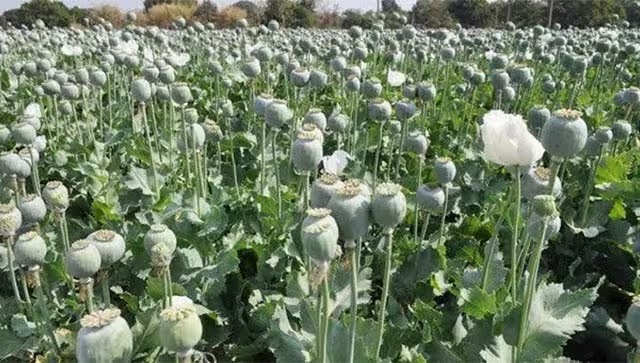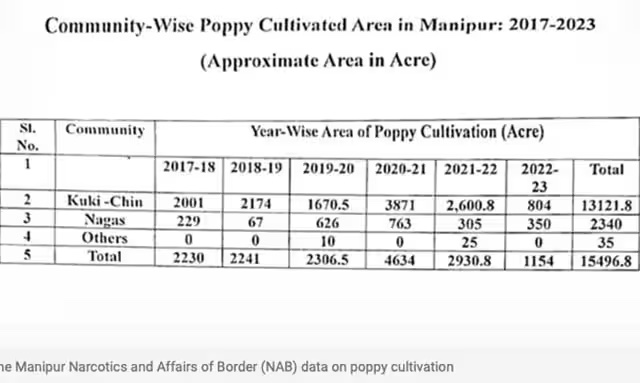Curse of drugs and how the Golden Triangle entangled disturbed Manipur
The battle against drugs and poppy cultivation in Manipur could be long drawn which might stretch for many years
Rajeev Bhattacharyya Last Updated:July 14, 2023 16:07:44 IST

Poppy cultivation in Manipur. Image courtesy Researchers of ICSSR
Source: https://www.firstpost.com/opinion/curse-of-drugs-and-how-the-golden-triangle-entangled-disturbed-manipur-12866522.html
The infamous Golden Triangle known for decades to manufacture a variety of drugs has entangled the border state of Manipur which has been witnessing unrest for almost the past two months.
Manipur, one of the four Indian states bordering Myanmar, has witnessed a spurt in poppy cultivation and manufacture of drugs in recent years prompting the government to launch a ‘war on drugs.’ The crackdown is one of the several reasons that triggered turbulence in the state since 3 May that is yet to subside.
The state’s linkages with the Golden Triangle and overseas drug cartels have been a subject of discussions and writings for quite some time. Newspapers editorials in Manipur have often underscored the phenomenon which is in addition to the statements by senior government officials. In January, former police chief of Manipur P Doungelwent on record to say that the state has become the “direct victim of the infamous golden triangle.”
More recently, the development in Manipur has been analysed elaborately in a paper titled ‘Rise of Alternative Agriculture: The Case of Poppy Cultivation’ which was authored by Ch. Priyoranjan Singh, Homen Thangjam and H Isworchandra. The paper was submitted to the Indian Council of Social Science Research (ICSSR) last year.
The paper quotes diverse sources citing the linkages between the state and the Golden Triangle that encompasses regions in the three countries of Myanmar, Thailand and Laos. It delineates the extent and implications of poppy cultivation at certain regions in the hill districts across the border state that has a long border of 398 km with Myanmar.
In Myanmar, the hub of drugs continues to be Shan State in the Golden Triangle which was further confirmed by resistance fighters and police officers under the National Unity Government (NUG) to this correspondent between January–March at different locations in Chin State and Sagaing Region. As such, it may be safely concluded that whatever opium is ferried from Manipur to Myanmar is headed to the laboratories in Shan State.
The paper explains how poppy cultivation in Manipur expanded from small beginnings in the late 1990s to cover a vast expanse in the state. It quoted Inspector General of Police Lunsieh Kipgen as saying that initially some zones of Ukhrul district and the adjoining area of Saikul of Sadar Hills in Senapati district were known to have poppy cultivation.
“Saikul area came to be known as the hotspot of massive poppy cultivation for commercial intent. Chandel and Churachandpur districts soon figured in the poppy-growing map of the state. Koubru hill range in Sadar Hills, Senapati, parts of Tamenglong and Senapati districts too soon found ‘plots’ in the poppy map. For example, in the New Samtal Village of Dingpi region in Chandel bordering Myanmar, poppy cultivation started in 1996–97. Poppy seeds were brought from Ukhrul areas and Myanmar by people who were already into the trade,” the officer said.
The researchers found that there was an alarming CAGR (compound annual growth rate) of 79.78 per cent from the year 2016 to 2019. The hilly tracts bordering Myanmar were found to have been most adversely impacted by the phenomenon. “The districts of Ukhrul and Chandel to the east neighbouring Sagaing Division in Myanmar and the district of Churachandpur to the south, neighbouring the Chin Hills of Myanmar, have become prime targets for poppy cultivation in recent times.”

It may be mentioned that the boom in poppy cultivation in Manipur coincided with a plummeting trend in Myanmar between 2014-20. The trend has reversed after the military coup early in 2021 resulting in an increase of 33 per cent in the cultivation of poppy as revealed in the latest report of the United Nations Office on Drugs and Crime(UNODC).
An Indian government official engaged with an agency to check drug trafficking in the country’s North East attributed the increase in poppy cultivation in Manipur to the demand from Shan State in the Golden Triangle. “The crackdown against poppy cultivation in Myanmar before the coup compelled the drug barons to explore alternatives. The remote areas along the India-Myanmar border were ideal for cultivation as they could avoid detection. The farmers and middlemen garnered profits and it was not long before the cultivation spread to more areas in Manipur,” he said on condition of anonymity.
Conversation with another government official revealed other aspects of the phenomenon in Manipur including how new markets were found in the Indian mainland for the opium in Manipur. He pointed out that middlemen were successful in establishing new buyers in many far-off states in the country such as Uttar Pradesh and Maharashtra and links with cartels in other neighbouring countries.
“Consumption of raw opium is an old tradition in India. Some middlemen in Manipur’s Imphal valley realized that greater profits can be earned by selling the opium in some states of the country (India) then to the laboratories in Shan State. Similarly, some of them also understood that manufacturing Heroin and Brown Sugar and selling them in the Indian market was more lucrative than importing consignments from Myanmar,” he said.
Several laboratories manufacturing these commodities had been busted in Manipur over the past few years. The paper submitted to ICSSR cited an incident on 3 December 2019 when a heroin-manufacturing unit was raided by the police at Kangpokpi in which 41 kilograms of heroin worth Rs 165.172 crore ($2,01,36,421 approximately) in the international market was seized. Altogether six drug laboratories were destroyed by the security personnel in 2019.

According to an estimate, a total area of 4565 acres of poppy fields had been destroyed in the hill areas of Manipur between 2016-19. The paper mentions that the maximum eradication was in Senapati (2,497 acres) followed by Chandel (795 acres) and Churachandpur (791 acres). Bishnupur was the only district in Imphal valley where poppy cultivation was reported which had also witnessed raids by the police.
The battle against drugs and poppy cultivation in Manipur could be long drawn which might stretch for many years. Some officials are of the view that only about one-third of the total area under poppy cultivation had been destroyed in the state so far. There are vast tracts in the remote mountain slopes which have remained beyond the reach of government agencies. There are arguments as well making a case for providing viable alternatives to the farmers growing poppy for long-term results on the government’s ‘war on drugs’.
ABOUT US
Sanaleipak is dedicated to the people of Manipur as a placeholder for valuable information.
